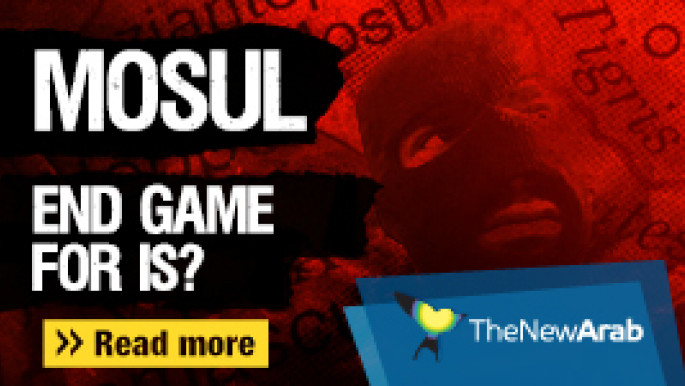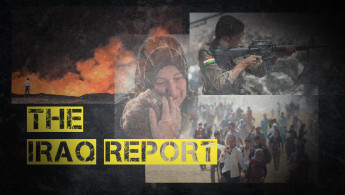The Iraq Report: Political deadlock threatens post-IS peace hopes
Click here to receive The Iraq Report each week in your inbox
Continuing instability and domestic politicking have crippled the lives of many ordinary Iraqis. With corruption rife, Iraq is struggling to navigate its quagmire of human rights abuses, spiralling humanitarian crises and a near-total lack of security.
While Iraqi troops continue to make painstakingly slow progress in Mosul against Islamic State group militants, there are increasing worries that large-scale involvement of the state-sanctioned, Iranian-controlled Shia militias of the Popular Mobilisation Forces could undermine any successes.
Not only are the PMF alleged to be carrying out operations to further Iranian strategic interests, the fates of thousands of Sunni Arab civilians abducted by the Shia militants remains unknown.
The fight against IS
As the clock ticks down on Baghdad's self-imposed May 21 deadline to complete the recapture of Mosul, the number of displaced civilians has now topped half a million people and is forecast to only increase, with a further 250,000 still trapped in the city.
This weekend, the PMF made a strategic pivot to focus on al-Ba'aj, near the Syrian border – a move described as designed to help Iran's proxies secure a land route through Iraq and into Syria.
The PMF has been laying siege to IS-held Tal Afar, a Turkmen-majority city 60km west of Mosul, since last year.
But a high-ranking Kurdish Peshmerga commander has indicated that the PMF are now concentrating forces on helping Tehran realise "an Iranian dream" of forming a route that connects Iran to Latakia, on the Syrian Mediterranean coast, with Iraq acting as a transit hub.
Though Tal Afar is clearly important, Iran's senior Islamic Revolutionary Guard Corps (IRGC) commander, Qassem Soleimani, has reportedly ordered the PMF to prioritise al-Ba'aj while Tal Afar is under siege with an eye to moving units across the border to take Deir al-Zour and Mayadin, both IS-held towns in Syria.
The PMF has repeatedly confirmed that it would be willing to cross over to engage IS in Syria, despite it being - technically - an Iraqi force supposedly accountable to Iraq's Prime Minister Haider al-Abadi, not Tehran's Soleimani.
The PMF's change in priorities may also be linked to a leaked Iraqi intelligence report that says IS "caliph" Abu Bakr al-Baghdadi is likely in one of four locations, one of them being al-Ba'aj. The others are the Iraqi border town of al-Qaim, as well as the Syrian towns of Deir al-Zour and Albukamal - all within close proximity to one another.
 |
| A girl carrying a baby in a backpack - the latest Iraqi children to be displaced from Mosul - homeless, afraid and facing an uncertain future [AFP] |
Sunni Arab resentment
Defeating IS will definitely not end Iraq's woes, though, as fears mount that an even fiercer Sunni Arab insurgency may emerge once the militants have been defeated in Mosul and other areas still under the group's control.
Sunni Arab resentment is not necessarily fuelled by sectarianism, but by a well-founded sense of marginalisation and abandonment by the Shia-dominated Iraqi government. Areas declared "liberated" by Baghdad include sites of mass destruction, with infrastructure devastated in the fight. It will cost billions to rebuild these cities - and Iraq’s corrupt system is unlikely to foot the bill, despite Iraq's oil production increasing by 36 percent since 2014 to around 4.2 million barrels per day.
Reuters reported earlier this month that reconstruction in Mosul alone is set to cost billions of dollars and take five years, yet officials reported that they were due to receive only $44.5 million for the entirety of Nineveh province - including the metropolis of Mosul with a pre-war population of about three million.
Apart from the sheer destruction in other recaptured Sunni Arab towns and cities - sometimes as much as 80 percent of a town - there is still a lack of economic activity. A UN-funded poll conducted by a Baghdad-based consultancy said that an average of 65 percent of people in Tikrit, Ramadi, Fallujah, Rutbah and Shirqat live in poverty, while those residing in the countryside fare far worse.
 |
|
This is not only likely to further fuel Sunni Arab resentment and a belief that they are being discriminated against, no Sunni political party has been recognised as adequately representing such concerns in parliament.
Divisions and recriminations between Sunni political groups who fail to agree a united front while jockeying for influence and power threaten to close the door to hopes for the political process succeeding, making military means all the more attractive to many disenfranchised Sunnis.
A variety of ideologues, including Iraq's former Baathist rulers, are thought to be waiting in the wings for the right opportunity to take advantage of this mass Sunni Arab resentment to launch a revolutionary war - though it remains unclear which ideology or political movement would lead any such charge.
Political divisions intensify
The Sunni Arab political and economic weakness comes despite divisions between Iraq's ruling Shia parties. Following reports that Abadi may decide to break away from his Shia Islamist Dawa Party's political bloc - a group of Shia parties named the State of Law coalition, led by Vice-President Nouri al-Maliki - an aide to Maliki warned Abadi such a move would be "political suicide".
Though both Abadi and Maliki are from the same party, Maliki is a constant thorn in his colleague's side, believing that Abadi usurped his premiership in 2014 after Maliki was blamed for instigating the sectarian strife that led to the rise of IS and the loss of about a third of Iraq.
Ever since, Maliki - recently likened to Saddam Hussein after giving a speech with Baathist-era songs in the background - has sought to undermine Abadi, and used the State of Law coalition to block numerous new laws in order to preserve the status quo he founded, largely understood to be the cause of virulent sectarianism, rife corruption and nepotism.
The infighting has led to a deadlock that has seen a further splintering of the Shia political camp, with some groups seeking to take advantage of the chaos. On Monday, the Iraqi High Electoral Commission announced that five new parties had been formed, bringing the total up to 330 different political entities throughout Iraq. Some 80 percent of these are parties built along religious and sectarian lines, with around 10 percent maintaining their own armed militias - demonstrating just how fractious Iraqi politics remains.
As the parties bicker among themselves and create new branches of much the same ideological trends, the PMF is attempting to become Iraq's ascendant military and political power. According to reports, the Shia militants are in discussions with Iraq's ruling National Alliance - which contains the State of Law coalition - in order to field candidates for the local elections this year, and possibly the general elections slated for next year.
This in turn has generated concern that Iraq's next prime minister may be an overt Shia militant with military and political ties to Iran - further cementing the PMF's reputation as an Iraqi version of Tehran's IRGC.
 |
| Shias in Karbala mark the birth of the 9th century Imam al-Mahdi with the Shaabaniya ceremony [AFP] |
Crumbling human rights
All this comes amid the seemingly never-ending erosion of human rights and living standards that has seen Iraq reach levels of insecurity, instability under-development that outstrip even the suffering felt under the Baathist dictatorship of Saddam Hussein.
Abject poverty, corruption and continued war have led to education standards slipping, with some children in areas controlled by the Kurdistan Regional Government absent from school due to displacement being forcibly expelled after a decision from Baghdad’s education ministry and a lack of action from the KRG's education ministry.
The violence has also pushed an entire generation of Iraqi children out of school, with the orphans of those killed during the war against IS forced to work manual labour jobs in order to support their brothers and sisters. That a return to school would mean their families starve, highlights the plight of Iraq's children and the grave uncertainty of the future of what was once the most educated and literate Arab country.
Causing further damage to Iraq's education is the fact that university professors are now being paid less than Shia militants. Sarcastically mocking this new reality, one Baghdad University lecturer said that he was thinking of putting down his pen and his books and picking up a Kalashnikov rifle to join the "ignorant blessed with bounties" while Iraq's intelligentsia suffers. Meanwhile, Fadhil al-Hassani, a PMF commander and cleric, threatened to "cut out the tongues of anyone who speaks against [the PMF]".
Iraqi Christians take extremist Shia cleric to court
It is not just academics and civil rights activists - seven of whom were abducted by militiamen in Baghdad - that are threatened by Iran-leaning clerics, Iraq's already marginalised religious minorities are also at risk.
Mirroring rhetoric used by IS extremists, the head of the Iraqi government's Shia Endowment, Alaa al-Mousawi, said in a sermon that the Christians and Sabians – a small religious community - should either convert to Islam, or else be killed if they do not pay a tax levied upon non-Muslims.
This has led to some Christian groups announcing that they were preparing legal action against Mousawi, claiming that he was inciting against them and fostering religious violence.
With the Iraqi government seemingly incapable or unwilling to tackle such extremism within its own ranks, it is unlikely that Iraq will reverse the catastrophic damage caused to its social, educational and political structures in the foreseeable future.
The Iraq report is a new weekly feature at The New Arab.
Click here to receive The Iraq Report each week in your inbox



